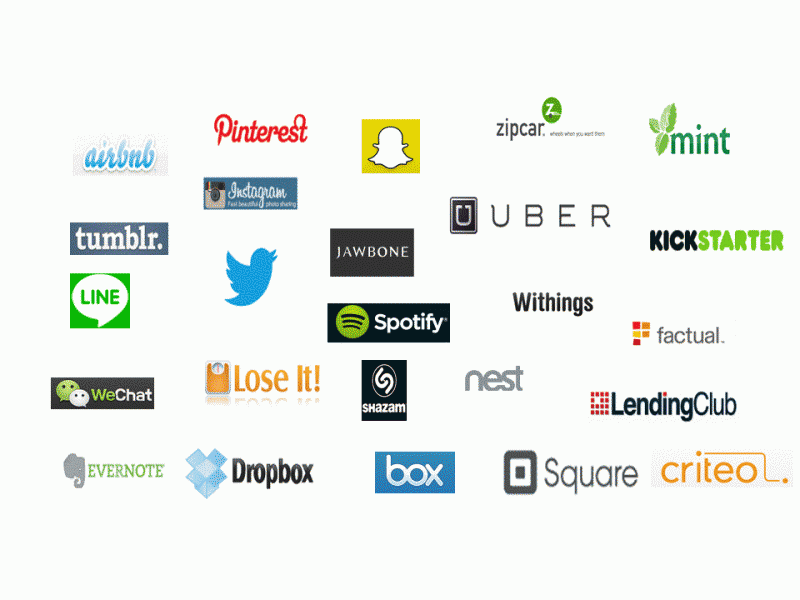LeWeb: The Next 10 Years

What do all of these players have in common?
Most of them are US startups initially backed by venture capital (VC). Some of them are now worth more than $1 billion; others are planning for an IPO; and a couple of them have been acquired for a lot of money while generating little (if any) revenue. Most originated in social media, in the collaborative economy, and pretty much all of them depend on mobile as a significant and growing part of their business. They represent the typical attendees at the LeWeb conference in Paris, looking to become the next Facebook or Amazon in the next 10 years. Some other smaller and less well-known startups competing in LeWeb's startup competition this year may join this list: http://paris.leweb.co/programme/startup-competition
In fact, what they really have in common is that they are all digital disruptors leveraging digital platforms to create new experiences on top of connected devices. They are taking advantage of open development tools and free infrastructure resources to overhaul products, invert category economics, and redefine customer relationships. They are more agile than traditional companies. As my colleague James L. McQuivey stated recently, digital disruption requires an organizational fix if you don’t want your company to be disrupted.
So what can we expect in the next 10 years? This is the ambitious theme of LeWeb’s conference this year in Paris as it celebrates its 10th anniversary. As expected, many of the conversations during day one centered on the proliferation of connected devices and objects, the blurring boundaries between virtual and real worlds, and our ability to make sense of the data we will collect from our connected bodies and from the environment around us. Delivering contextualized experiences without infringing privacy will be the next battleground.
George F. Colony, Forrester’s founder and CEO, delivered a speech on the main stage at LeWeb today that put these changes in perspective. He referred to the age of the customer, which Forrester defines as a 20-year business cycle in which the most successful companies will reinvent themselves to systematically understand and serve increasingly powerful customers. He focused on one early element of customer empowerment — the mobile mind shift.Your customers expect any information or service they desire be available to them on any device, in context, at their moment of need. To win, serve, and retain these customers, you will have to move from systems of record to systems of engagement. Apps are just a small part of that equation. Instead, we’re talking about re-engineering your entire company to deliver great digital experiences. You can find more about his speech on his blog here.
I think we’re just scratching the surface with regard to the implications of this mobile revolution. The software companies via which you can deliver these great mobile experiences are all US-based right now. At LeWeb, the focus is mainly on Silicon Valley startups; that’s where innovation is coming from today because of the combination of venture and human capital. But I recently had the opportunity to spend some time in Tel Aviv and in Asia, and I think we’ll see a lot more innovation coming from outside the US, with the sheer size of the audience in Asia Pacific in particular elevating the region’s role in mobile services innovation. China already has more than 400 million smartphone users — more than the US or Western Europe. Moreover, it doesn’t have the established enterprise infrastructure that chains too many Western companies to their legacy policies, processes, or platforms. The combined newness of the Internet and mobile makes everyone an entrepreneur.
As such, a lot of the new LeWeb stories in the next 10 years will be written in Asia — not just in the Valley.
What interesting innovation do you see being developed outside the US and Western Europe? Let us know in the comments.
